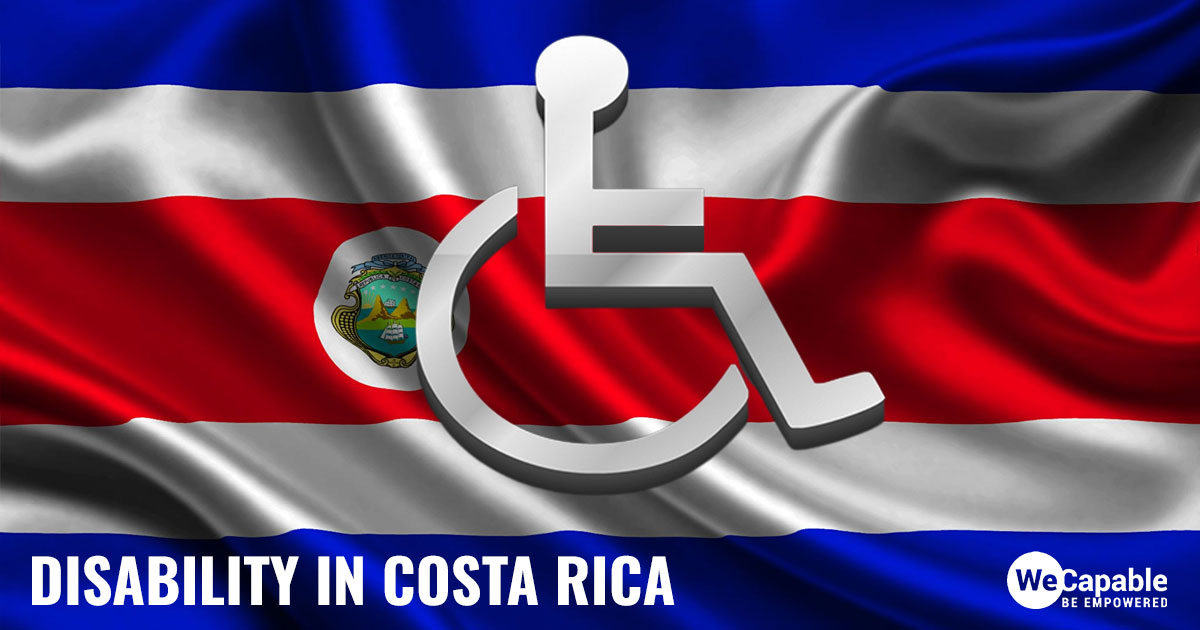Costa Rica, officially known as the Republic of Costa Rica, is a country situated in the Central America. The country is known for its rich beaches and biodiversity which attracts tourists from all over the world. For its residents, it is the happiest Latin American country according to the World Happiness Report (2021). Let us see, how happy the People with Disabilities living in this country are?
Definition of Disability in Costa Rica
The laws of Costa Rica defines disability in very simple words. Disability is defined as “any physical, mental or sensory impairment which substantially limits one or more of an individual’s major activities”.
On breaking down the definition, we see that disability in Costa Rica can be categorized in three forms –
- Physical Impairment
- Mental Impairment, and
- Sensory Impairment
Further, the impairments need to be of such magnitude that it limits the affected person’s ability to perform one or more major activities of his life.
Disability-Related Statistics of Costa Rica
According to the 2011 National Census, 10% of people in Costa Rica are inflicted with one or the other disability. The most common disability in Costa Rica is a visual impairment that cannot be corrected by spectacles or lenses. The incidence of disability is slightly higher in females as compared to males.
While 93% of people without disabilities complete their primary education in Costa Rica. In contrast, only 81% of children with disabilities are able to do so. The difference is visible in the completion ratio of secondary education too. While 50% of non-disabled people complete their secondary education, only 43% of disabled people are able to do so. Similar differences can be noted in university access university completion as well as gainful employment ratio too.

Laws and Legislation Regarding Disability in Costa Rica
Following laws in Costa Rica deal with the rights of persons with disabilities:
1. The Equal Opportunities Law for People with Disabilities (Act 7600)
The law states that no person shall be discriminated based on their disability if they are equally capable of others. This is the law that provides the definition of disability and accessibility which were brought into line with UN Conventions on the Rights of Persons with Disabilities in the year 2014. The law requires public places and transport to be easily accessible to persons with disabilities without any discrimination.
The law promotes equality among the disabled and non-disabled citizens of Costa Rica in the areas including –
- Health
- Education
- Work
- Family Life
- Recreation
- Sports
- Culture, etc.
2. Law on the Inclusion and Protection of Persons with Disabilities in the Public Sector (Act 8862)
This is the law meant for improving employment opportunities for persons with disabilities. The law reserves a quota of 5% for persons with disabilities. However, the reservation is granted only in the public sector. The private sector is not bound by any such quota.
3. Official Language (Act 9049)
Since June 2012, Costa Rica Sign Language has been adopted as one of the official languages of the country.
Legal Rights of Employees with Disabilities in Costa Rica
As mentioned above, 5% of job opportunities in the public sector are reserved for persons with disabilities. In the private sector, they cannot be discriminated based on their disability if they fulfill all other job requirements.
The Costa Rican law mandates the state to provide technical assistance to employers who employ persons with disabilities for adapting to the work environment according to their needs. The adaptation includes modification of physical infrastructure as well as technical aids or support services.
Institutions or organizations employing persons with disabilities are required to have internal policies to safeguard persons with disabilities against any kind of discrimination. Further, the employer too cannot discriminate against any employee with disability at any stage such as application, hiring, training, firing etc.
Social Status of Persons with Disabilities in Costa Rica
Accessibility-wise, Costa Rica is not at par with many developed countries. The international standards have been embedded in the laws of Costa Rica but the country lacks in the proper execution of the laws. Though the government is trying its best to bring equality and inclusion in society, compliance has been slow.
28th of May is celebrated as National Day for Disabled Persons for promoting awareness about persons with disabilities. In order to promote inclusivity, a national prize is awarded to business organizations that are recognized as disabled-friendly.
Not a very prominent one but Costa Rica has a political party that has disability rights at its core. The political party ‘Accessibility without Exclusion’ is built on the foundation of rights for persons with disabilities.
In recent decades Costa Rica has started participating in Paralympics thus promoting persons with disabilities to participate more in sporting activities.
Talking about terminologies, terms like invalid, incapacitated, handicapped etc. that are considered derogatory in many countries are very common in Costa Rica. In fact, these terms were used officially by Costa Rica in its 2014 report to the UN.
Use the citation below to add this article to your bibliography
"Disability in Costa Rica: Definition, Laws, Employment and Social Status." Wecapable.com. Web. June 15, 2025. <https://wecapable.com/disability-in-costa-rica-definition-laws-employment-social-status/>
Wecapable.com, "Disability in Costa Rica: Definition, Laws, Employment and Social Status." Accessed June 15, 2025. https://wecapable.com/disability-in-costa-rica-definition-laws-employment-social-status/
"Disability in Costa Rica: Definition, Laws, Employment and Social Status." (n.d.). Wecapable.com. Retrieved June 15, 2025 from https://wecapable.com/disability-in-costa-rica-definition-laws-employment-social-status/

Leave a Reply